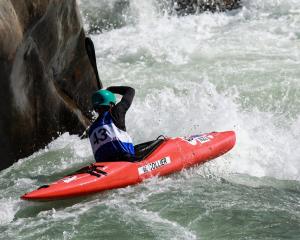Life changed dramatically for Curtis McGrath last year when he lost both his legs when he stood on a mine in Afghanistan.
McGrath (25), a former pupil at Wakatipu High School, was on an overseas posting with the Australian army.
He was in a high-risk role, working as a ''searcher'' in an engineers' patrol. Engineers going to war zones have nine months' strict training and one person in a patrol of four is trained in advanced first aid.
He was clearing an unoccupied checkpoint in Afghanistan when he stepped on a home-made mine and was severely injured.
It took off his left leg below the knee and his right leg at the knee.
''It also shattered bones in my wrist, burnt my left arm, perforated my ear drums and gave me a large wound at the back of my thigh,'' McGrath said.
''I had to keep my cool otherwise I would have died.''
McGrath was put on a helicopter and taken to bases in Afghanistan for emergency surgery before returning to his home town of Brisbane.
It is just over a year since the accident and McGrath, equipped with artificial legs, is still adjusting to the drastic changes in his life.
''It is very difficult to adapt at such a fast pace,'' he said.
''Learning everything again is hard. Most people don't realise that there are trip hazards on footpaths on the street. I have to watch the footpath and if it slopes a certain way I have to walk with a different step and make sure I lift my toes. That is the hardest part for me.''
He does not have any regrets about what happened to him.
''You can't go into a war zone and not expect something bad to happen,'' he said.
''Life is like that. Sometimes you get a spanner in the works and you just have to get on with it.''
He has a positive attitude to his predicament and is keen to be successful in his new life.
McGrath is able to drive a car, which gives him independence.
His first taste of Paralympic sport was in the United States Marine Games in San Diego where he won three gold medals in swimming.
He is joining a Mates for Mates kayaking trip from Sydney to Brisbane next month. The group does charity work for wounded Australian soldiers.
At the weekend, he joined an Athletics New Zealand Paralympic camp in Dunedin and tried his hand at the throwing events.
He has joined Canoeing New Zealand and his goal is to qualify for the 2016 Paralympics in Rio de Janeiro.
Sport is helping him adjust to his new life faster.
''In sport, you are getting your body to do things you don't do every day. It helps your body to adjust more easily to everyday things.''
Sport has also given McGrath a chance to set goals, and is keeping him healthy.
His parents, Kim and Paul, and siblings Brent (20) and Sophia (14) also live in Brisbane.
Ten athletes attended the two-day Paralympic camp at the Caledonian Ground and the High Performance Sport New Zealand gymnasium.
Others with a chance of making New Zealand Paralympic teams included Jono Brownjohn (17), of New Plymouth, Liam Malone (19), of Nelson, Richard Nelson-Parker (19), of Auckland, and Dunedin's Holly Robinson, Rory McSweeney and Anna Grimaldi.












